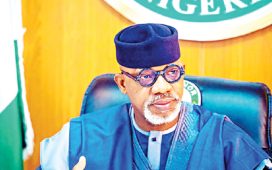The European Union Election Observation Mission to Nigeria Monday issued its first report in which it catalogued how Saturday’s presidential and national assembly elections in Nigeria were bungled and highlighted the massive failures of the umpire, INEC.
In the report, the EU election observers said, “INEC lacked efficient planning and transparency during critical stages of the electoral process, while on election day trust in INEC was seen to further reduce due to delayed polling processes and information gaps related to much anticipated access to results on its Results Viewing Portal (IReV).”
They added that, “During the early stages of collation, presidential result forms from polling units were not displayed on the IReV, while Senate and House of Representative results were slowly published. Presidential election result forms started to be uploaded after 10 pm on election day, raising concerns and reaching only 20 per cent by noon on 26 February. Later the same evening, INEC explained the delay with “technical hitches.”
Here is the full text of the statement.
“On 25 February, Nigerians went to the polls in highly anticipated presidential and National Assembly elections that the Independent National Electoral Commission (INEC) kept on schedule despite a volatile and challenging environment.
“Fundamental freedoms of assembly and movement were largely respected, yet the full enjoyment of the latter was impeded by insufficient planning, insecurity and the prevailing Naira and fuel shortages.
Abuse of incumbency by various political office holders distorted the playing field and there were widespread allegations of vote buying. Media provided an extensive coverage of the three leading campaigns, while disinformation interfered with voters’ right to make an informed choice on election day. The EU EOM is continuing its observation of the ongoing collation and tabulation of results throughout the country.
“INEC’s operational capacity was hampered by the ongoing fuel and Naira shortage. Insecurity prevented it from accessing some Local Government Areas (LGAs), notably in the South. Attacks on INEC premises, including just days before polling, hindered preparations in affected areas, while instilling fear in voters. Overall, stakeholders had expressed confidence in INEC’s independence, professionalism, and voter information efforts, but this decreased ahead of elections.
“INEC lacked efficient planning and transparency during critical stages of the electoral process, while on election day trust in INEC was seen to further reduce due to delayed polling processes and information gaps related to much anticipated access to results on its Results Viewing Portal (IReV).
“In the lead-up to elections, the widely welcomed Electoral Act 2022 introduced measures aimed at building stakeholder trust, however leaving some important gaps in terms of accountability and INEC’s power to enforce the law. Weak points include a lack of INEC empowerment to enforce sanctions for electoral offences and breaches of campaign finance rules. Positively, INEC benefited from more timely financing than for previous contests. Other new provisions also aimed to enhance transparency of results.
“The introduction of the Bimodal Voter Accreditation System (BVAS) and the IReV for the 2023 elections was perceived as an important step to ensure the integrity and credibility of elections. However, delayed training of technical personnel, an inadequate mock testing exercise, and a lack of public information on the election technologies diminished expectations and left room for speculation and uncertainty.
“During the early stages of collation, presidential result forms from polling units were not displayed on the IReV, while Senate and House of Representative results were slowly published. Presidential election result forms started to be uploaded after 10 pm on election day, raising concerns and reaching only 20 per cent by noon on 26 February. Later the same evening, INEC explained the delay with “technical hitches.”
Read also: Discrepancies: PDP, LP urge INEC to stop further results announcements
According to Mathew Page, an analyst, “INEC’s complexities and idiosyncrasies make simple characterisations of its performance difficult. It is both a guarantor of credible elections and a mechanism used to undermine them. It is tasked with monitoring party primaries, campaign spending and electoral offences, but largely lacks the means to police them.
“It readily cancels dubious results in some elections while doggedly defending them in others. It works closely with respected civil society organisations, but also frequently ignores their observations, bristles at their advice and readilv accredits election observers from fake pro- government NGOs. Its presidentially-appointed leadership cadre includes some elections gurus but also some pliable, perhaps even partisan, figures.
“It has a larger staff and budget than most other government agencies yet it frequently experiences planning, logistical, and technical failures that make it easier for politicians to influence election outcomes. It performed better in 2011 and 2015 than it has before or since. Most concerningly, it still struggles with the basics despite two decades and tens of millions of dollars’ worth of international training, advice and assistance.”







